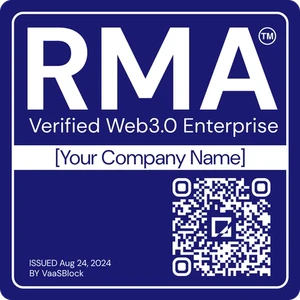
Helium
Risk Management
?Risk Management
The RMA™ is a blockchain credibility certification assessing governance, transparency, security, and results, providing trusted verification for businesses in Web3.
VaaSBlock has not audited this project and cannot vouch for this organization.
RMA™ Status: ❌ Unverified
Verification of 6 major compliance criteria.
Technology
?Technology
A collection of public facing information, data collected through partners and our own tools view we present a projects technology in one place for easy verification.
Analysis and testing of tech infrastructures.
Marketing
Alpha?Marketing
Top level look at a projects marketing capablities currently in alpha this section will grow to show quickly how a project promotes itself and the effectiveness.
Screening of user base and community feedback.
Background
?Background
Using multiple public facing sources across the web view a summary of a projects purpose, key achievements and general overview.
Collection of basic administrative documentation.
Risk Management
Last Updated
2025/4/16
Transparency
Transparency Score
Algorithmic assessment of a project’s transparency level, using multiple public data points to measure its commitment to compliance, documentation, and clarity in communication.
Transparency Score
Category Rank
A ranking that positions the organization among its industry peers, evaluating its relative performance based on key compliance, credibility, and transparency indicators.
Category Rank
Helium vs Services
VaaSBlock Rank
A global ranking that compares the organization against all entities listed on VaaSBlock, reflecting its overall credibility, transparency, and operational performance versus the full Web3 ecosystem.
VaaSBlock Rank
Helium vs All Listed Organizations
Transparency
Transparency Score
Transparency Score
Algorithmic assessment of a project’s transparency level, using multiple public data points to measure its commitment to compliance, documentation, and clarity in communication.
Category Rank
Helium vs Services
Category Rank
A ranking that positions the organization among its industry peers, evaluating its relative performance based on key compliance, credibility, and transparency indicators.
VaaSBlock Rank
Helium vs All Listed Organizations
VaaSBlock Rank
A global ranking that compares the organization against all entities listed on VaaSBlock, reflecting its overall credibility, transparency, and operational performance versus the full Web3 ecosystem.
RMA™
✘ UnverifiedCorporate Governance
The verification of fundamental governance, organizational structure, including verifying the entity’s legal registration and adherence to local laws and regulations.
Corporate
Governance

Team Proficency
Evaluation of an organization’s personnel, ensuring that crucial team members possess the expertise and dedication necessary to execute current business models and scale effectively.
Team
Proficiency

Technology & Security
Assessment of the organization’s technological framework, including blockchain integrations (where relevant), system architecture, and overall IT infrastructure.
Technology
& Security

Revenue Model
Comprehensively evaluation of a company’s income-generating strategies (how do they make or intend to make money), ensuring financial robustness and sustainability.
Revenue
Model

Results Delivered
The Results Delivered component of the RMA™ audit comprehensively evaluates an organization’s ability to achieve its goals and honor its commitments.
Results
Delivered

Planning & Transparency
The Planning and Transparency component of the RMA™ audit offers a thorough assessment of how an organization manages its workflow and prepares for unexpected challenges.
Planning &
Transparency

Technology
Marketing
Marketing Effectiveness
This score assesses the impact of detected marketing activity and the corresponding price movement of a token. The score understands whole market movements to ensure tokens are assessed fairly against peers.
Marketing Effectiveness
Confidence Index
This index determines our confidence in the score we have given. Generally, as more data is collected, the confidence index will increase. If a project has lots of activity, this confidence is earned faster.
Confidence Index
VaaSBlock Rank
This identifies where a project sits compared to all projects accessed for Marketing Effectiveness.
VaaSBlock Rank
Helium vs All Listed Organizations
Marketing Effectiveness
Marketing Effectiveness
This score assesses the impact of detected marketing activity and the corresponding price movement of a token. The score understands whole market movements to ensure tokens are assessed fairly against peers.
Confidence Index
Confidence Index
This index determines our confidence in the score we have given. Generally, as more data is collected, the confidence index will increase. If a project has lots of activity, this confidence is earned faster.
VaaSBlock Rank
Helium vs All Listed Organizations
VaaSBlock Rank
This identifies where a project sits compared to all projects accessed for Marketing Effectiveness.
No Chain No Gain™ Podcast ⛉
This Organization is yet to join the No Chain No Gain™ Podcast and share insights on what makes their business trustable and innovative.
💡 NCNG generated over 1 Million impressions in its first six months of existence.
PR Impact
PR Impact
VaaSBlock provides estimations to the impact that traditional digital media can have on a project. This is an early release; more areas of PR are planned in future versions.
Search Terms ? Search TermsThese are the terms we discovered the article for on page one of Google. | Est. Traffic ? Estimated TrafficWe estimate how much traffic an article will get. Generally, our estimations are slightly higher than those of more established tools. We are working on the algorithm all the time, and results could change. | Est. Value ? Estimated ValueBased on the estimated traffic we generate an estimation for what this traffic would have cost to generate if you tried to target these users with ads. The positions for the article on google and the location of the traffic are the major factors in this estimation. | |||
|---|---|---|---|---|---|
氦氣(Helium)-臺灣化工史料館 source: che.ncku.edu.tw | 氦氣(Helium)-臺灣化工史料館… — 氦氣(Helium)-臺灣化工史料館 source: che.ncku.edu.tw | Organic | che.ncku.edu.tw | ||
He(Helium) – 京和科技股份有限公司 source: jhgases.com.tw | He(Helium) – 京和科技股份有… — He(Helium) – 京和科技股份有限公司 source: jhgases.com.tw | Organic | jhgases.com.tw | ||
helium – PChome 24h購物 source: 24h.pchome.com.tw | helium – PChome 24h購… — helium – PChome 24h購物 source: 24h.pchome.com.tw | Organic | 24h.pchome.com.tw | ||
氦氣短缺解決方案 source: shimadzu.com.tw | 氦氣短缺解決方案… — 氦氣短缺解決方案 source: shimadzu.com.tw | Organic | shimadzu.com.tw |
| Est. Traffic | Est. Value | ||
|---|---|---|---|
氦氣(Helium)-臺灣化工史料館… — | |||
He(Helium) – 京和科技股份有… — | |||
helium – PChome 24h購… — | |||
氦氣短缺解決方案… — |
Ratings
AlphaOverall
Aggregated Rating
The combined score with AI-driven weighted analysis to provide the best possible project rating.
2747 verifications
Confidence Index
This index determines our confidence in the score we have given. Generally, as more data is collected, the confidence index will increase. If a project has lots of activity, this confidence is earned faster.
Low
2747 verifications
External Reviews
Third-party reviews are important for your reputation.We incorporate them into our Deep Due Diligence framework to provide a more comprehensive and transparent evaluation of each project. Collaborating with VaaSBlock ensures your reviews are not only acknowledged but actively contribute to building trust, improving your credibility, and maximizing the impact of your public reputation. Work with us now.
Background
Organization Name – Helium
Category –  Services
Services
About
powered by irmaAI
irmaAIHelium is a decentralized wireless network designed to provide global connectivity for Internet of Things (IoT) devices and mobile phones. Launched in 2013 by Amir Haleem, Shawn Fanning, and Sean Care…y, Helium aims to create a people-powered network that enables anyone to deploy wireless infrastructure and earn rewards through cryptocurrency incentives. The network operates on a unique model where individuals and businesses can set up Hotspots—wireless devices that provide network coverage and mine Helium’s native cryptocurrency, HNT.
The Helium Network comprises two main components: the IoT Network and the Mobile Network. The IoT Network utilizes Long Range Wide Area Network (LoRaWAN) technology to connect low-power devices over long distances, making it ideal for applications like environmental monitoring, asset tracking, and smart agriculture. The Mobile Network, known as Helium Mobile, offers cellular coverage through a decentralized model, allowing users to offload data onto Helium’s network via Wi-Fi hotspots. This approach challenges traditional telecom models by shifting the power of connectivity into the hands of individuals and communities.
Helium’s economic model revolves around the HNT token, which serves as the backbone of the network’s incentive structure. Hotspot operators earn HNT by providing network coverage and transferring data. To use the network, devices consume Data Credits, which are created by burning HNT, thereby reducing its supply and potentially increasing its value. This burn-and-mint equilibrium ensures a balance between network usage and token supply.
In April 2023, Helium migrated its blockchain to the Solana network to enhance scalability and performance. This transition allowed for faster transaction speeds and lower fees, benefiting both users and developers. Additionally, Helium introduced two sub-tokens: IOT and MOBILE, dedicated to the IoT and Mobile networks, respectively. These tokens facilitate specific network operations and provide more granular control over each network segment.
Helium’s decentralized model has attracted a global community of contributors, with over 421,000 active Hotspots deployed worldwide. The network’s open-source nature encourages innovation, allowing developers to build applications and services on top of the existing infrastructure. Furthermore, Helium’s partnerships with major carriers and enterprises have expanded its reach, integrating its network into various industries and use cases.
Despite its innovative approach, Helium has faced challenges, including regulatory scrutiny and questions about its business practices. In January 2025, the U.S. Securities and Exchange Commission filed a complaint against Nova Labs, Helium’s parent company, alleging unregistered sales of securities. The case was settled in April 2025 with a $200,000 agreement, allowing Helium to continue its operations without admitting wrongdoing.
Helium’s vision of a decentralized wireless network represents a significant shift in how connectivity is provided and monetized. By empowering individuals to participate in network infrastructure and rewarding them through cryptocurrency, Helium challenges traditional models and offers a new paradigm for global connectivity. As the network continues to grow and evolve, it holds the potential to reshape the landscape of wireless communication and IoT integration. Read More
Creation Date
January 2026
Headquarters
–
Organization Maturity Level
Growing Business
RMA™ Type
–
Notable Achievements
2013
Helium is officially founded
2019
Launch of Helium’s IoT network.
2023
Migrated to Solana blockchain ecosystem.
2025
Settled SEC case for $200k.
- vaasblock.com /
- Services /
- Helium


















